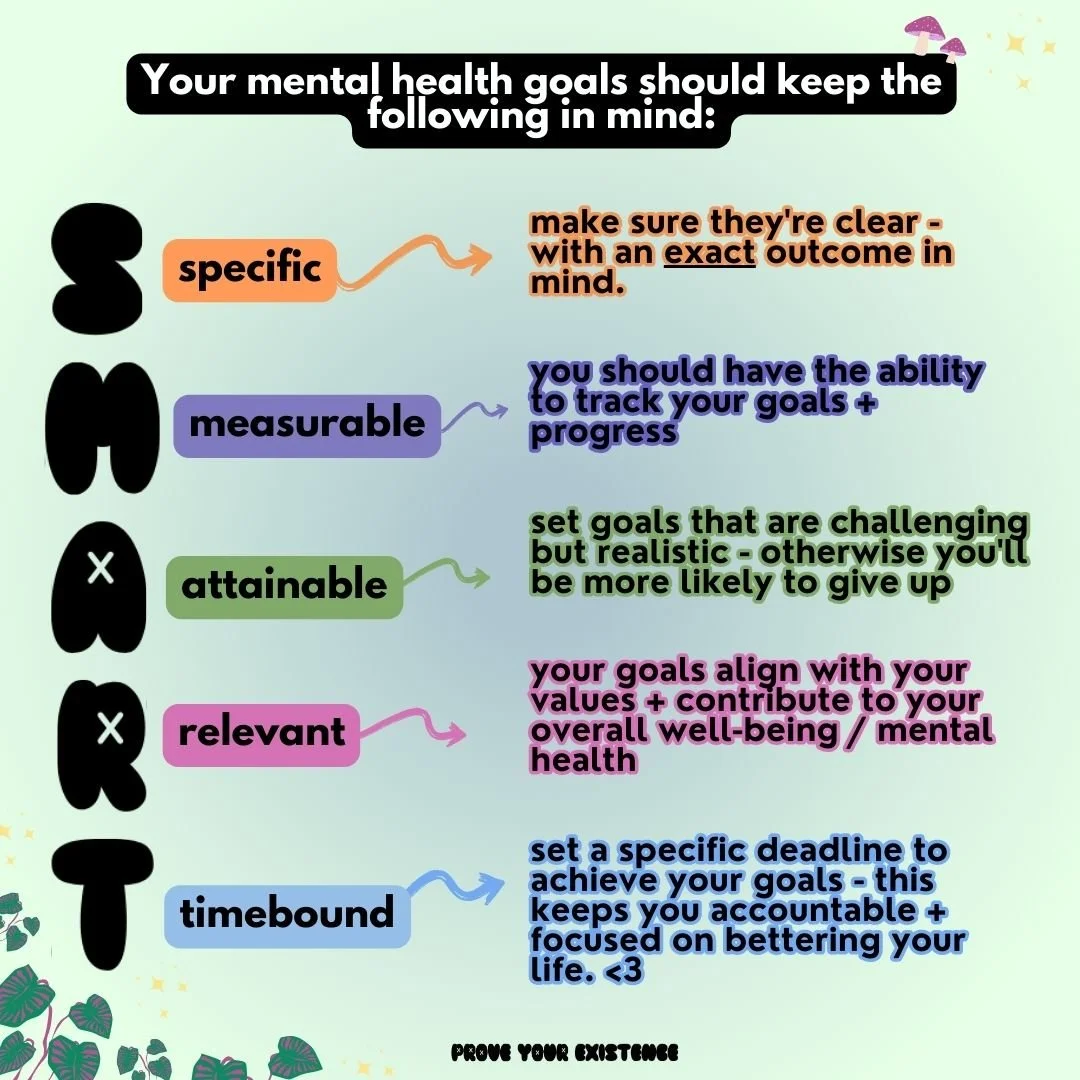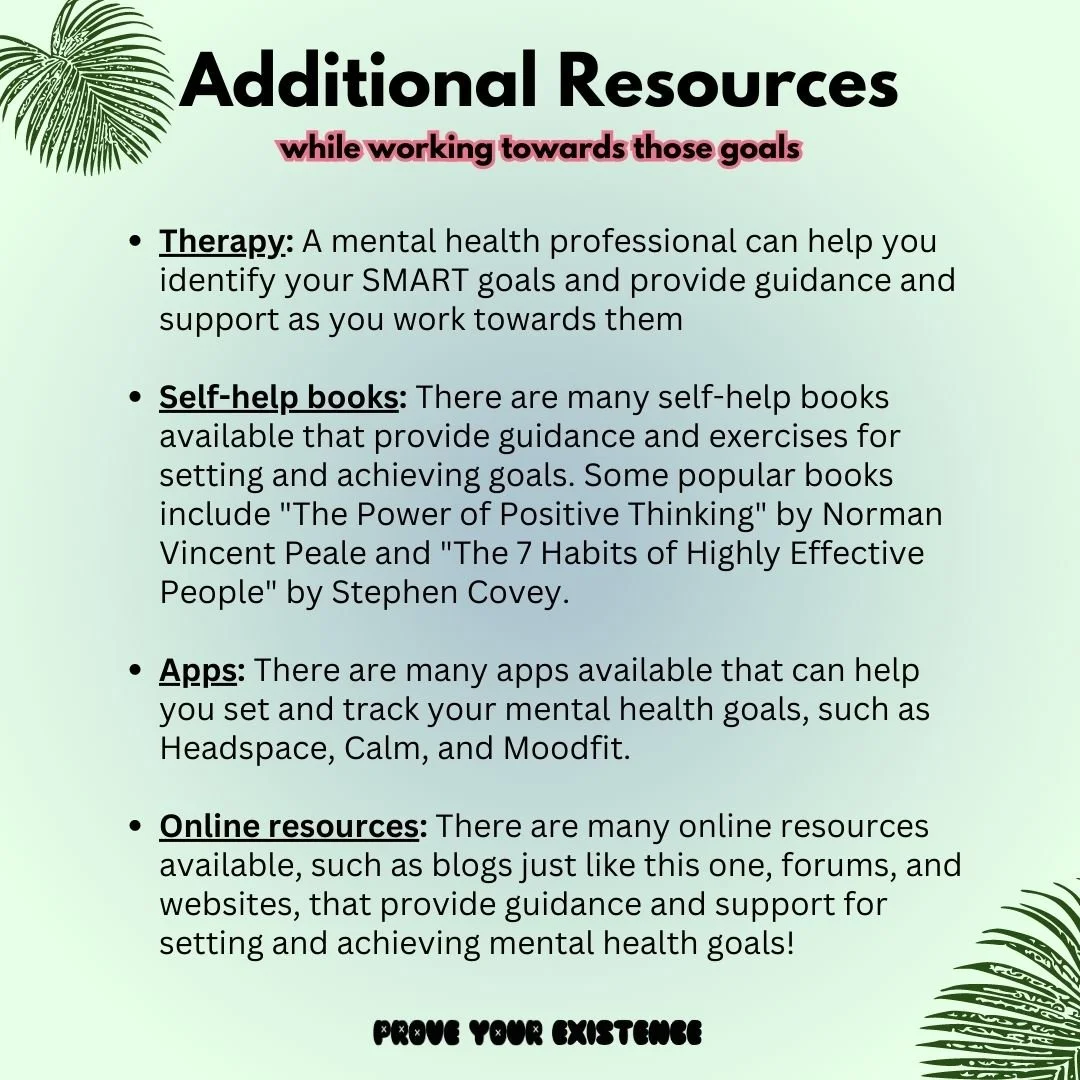How to Set SMART Goals for Your Mental Health
Setting goals is an important part of improving your mental health. However, not all goals hold as much weight and power. If you're looking to make progress in your mental health journey, it's important to set goals that are specific, measurable, attainable, relevant, and time-bound in order to maintain progress. These are known as SMART goals, and they can help you break down larger goals into manageable steps, stay motivated, and hold yourself accountable.
In this post, we'll define each component of SMART goals and provide examples of how to apply them to mental health goals. We'll also discuss the benefits of setting SMART goals, provide a step-by-step guide for how to set them, and share examples of SMART goals for various mental health concerns. By the end of this post, you'll have the tools you need to set and achieve your own SMART goals for mental health.
What are SMART goals?
Setting goals is an important part of improving your mental health, but not all goals are created equal. To make progress in your mental health journey, it's important to set goals that are specific, measurable, attainable, relevant, and time-bound - also known as SMART goals.
Here's what each component of SMART goals means:
Specific: Goals should be well-defined and focused. This means that you should clearly articulate what you want to achieve, why it's important to you, and what steps you'll need to take to get there. For example, "I will attend a weekly therapy session for six months to work on managing my anxiety and depression."
Measurable: Goals should be quantifiable so that you can track your progress and know when you've achieved them. This might involve setting specific targets, such as "I will meditate for 10 minutes every morning for a month to reduce my stress levels."
Attainable: Goals should be challenging but realistic. This means that you should choose goals that you believe you can achieve with effort and commitment. Setting unattainable goals can be demotivating and lead to feelings of failure. For example, "I will gradually increase my daily step count by 500 steps each week until I reach 10,000 steps per day to improve my physical and mental health."
Relevant: Goals should be aligned with your values and priorities. This means that you should choose goals that are meaningful to you and that will have a positive impact on your life. For example, "I will spend 30 minutes each day practicing self-care activities that I enjoy, such as reading or taking a bath, to prioritize my mental well-being."
Time-bound: Goals should have a specific deadline or timeline for completion. This helps to create a sense of urgency and can motivate you to take action. For example, "I will complete an online course on mindfulness within the next three months to develop new coping skills for managing my anxiety."
By using these components, you can create goals that are well-defined, achievable, and meaningful. In the next section, we'll discuss why setting SMART goals is so important for mental health.
Why are SMART goals important for mental health?
Setting SMART goals is important for mental health for several reasons:
They provide direction and focus: When you have clear goals, you know what you're working towards, which can help you stay motivated and focused.
They track progress: SMART goals are measurable, so you can track your progress and see how far you've come. This can be a great way to boost your confidence and keep you motivated.
They create a sense of accomplishment: When you achieve a SMART goal, it can be a great source of pride and accomplishment. This can help boost your self-esteem and confidence.
They help build resilience: By setting attainable goals, you can develop a sense of resilience and perseverance. This can help you bounce back from setbacks and challenges.
They improve mental health: By setting goals that are relevant to your values and priorities, you can improve your overall mental health and well-being. For example, setting a goal to practice self-care every day can help reduce stress and improve your mood.
When setting SMART goals for mental health, it's important to start small and focus on making gradual progress. Don't set goals that are too overwhelming or unrealistic, as this can lead to feelings of failure and frustration. Instead, start with small, attainable goals and build on them over time. Remember to be patient and kind to yourself as you work towards your goals.
In the next section, we'll discuss some tips for setting SMART goals for mental health.
Tips for setting SMART goals for mental health
Identify your values and priorities: Setting goals that align with your values and priorities can help you stay motivated and focused. Take some time to think about what's important to you and what you want to achieve.
Start small: If you have a larger goal in mind, break it down into smaller, more manageable steps.This helps you build momentum and confidence and can make it easier to tackle larger goals over time!
Figure out what you want from these goals: When setting goals, be as specific and detailed as possible. This can help you stay focused and on track. If your goal is to simply “improve your mental health” it doesn’t provide a clear enough vision as to what this looks like for you. Without a clear goal, you won’t have a clear path.
Celebrate small victories: Celebrating small victories along the way can help keep you motivated and build momentum. This can be as simple as giving yourself a pat on the back or treating yourself to something you enjoy. Psychologically, we are more likely to achieve goals and stay consistent when we reward ourselves for our wins!
Stay flexible: Remember that goals are not set in stone and things don’t always go as planned. Be open to adjusting your goals as needed and be kind to yourself if you experience setbacks or challenges (roadbumps are a part of the process)!
Breaks can help you come back stronger: While setting goals is important, it's also important to prioritize self-care and take breaks when needed. Remember to listen to your body and mind, and to give yourself permission to rest and recharge as needed.
Get an accountability partner: Setting and achieving goals can be challenging, and it's important to have a support system in place. You can get help with a professional, such as your primary care doctor, psychologist, or therapist to help you in setting realistic goals - or consider seeking support from friends, family members, or other resources to help you stay motivated and on track. You can also join our accountability and community group on Facebook for support!
The most important thing is to be patient and kind to yourself as you work towards your goals. With time and effort, you can make progress and improve your overall well-being.
Examples of SMART goals for mental health
Now that we've covered the benefits and tips for setting SMART goals for mental health, let's take a look at some examples of specific, measurable, achievable, relevant, and time-bound goals you can set for yourself:
"I will practice mindfulness meditation for 10 minutes every day for the next month.”
"I will exercise for 30 minutes, four times a week for the next six weeks."
"I will journal for five minutes every morning for the next week."
"I will spend 30 minutes each day engaging in a hobby I enjoy for the next two weeks to reduce stress and improve my mood."
"I will complete one chapter of the book I'm reading each week for the next month."
Remember, setting goals is not a one-time event. It's an ongoing process that requires patience, perseverance, and flexibility. By incorporating the tips and examples we've discussed, you can set goals that are tailored to your unique needs and support your mental health journey.
Additional Resources
If you're interested in setting SMART goals for your mental health, there are many resources available to support you. Here are a few to consider:
Therapy: A mental health professional can help you identify your SMART goals and provide guidance and support as you work towards them.
Self-help books: There are many self-help books available that provide guidance and exercises for setting and achieving goals. Some popular books include "The Power of Positive Thinking" by Norman Vincent Peale and "The 7 Habits of Highly Effective People" by Stephen Covey.
Apps: There are many apps available that can help you set and track your mental health goals, such as Headspace, Calm, and Moodfit.
Online resources: There are many online resources available, such as blogs just like this one, forums, and websites, that provide guidance and support for setting and achieving mental health goals.
Remember, you don't have to do this alone. There are many resources available to support you in your mental health journey.
Final Thoughts
Setting SMART goals for mental health can be a powerful tool for improving your overall well-being. By identifying goals that are specific, measurable, achievable, relevant, and time-bound, and by incorporating the tips and examples we've discussed, you can stay focused, track your progress, and celebrate your accomplishments along the way!
Just keep in mind that setting goals is an ongoing process which requires patience, perseverance, and flexibility. By taking the time to set goals that align with your values and priorities, and by seeking support from mental health professionals and other resources, you can make progress and achieve your goals over time. Be kind towards yourself on this journey and get excited for how your goals are going to help improve your life and happiness!








